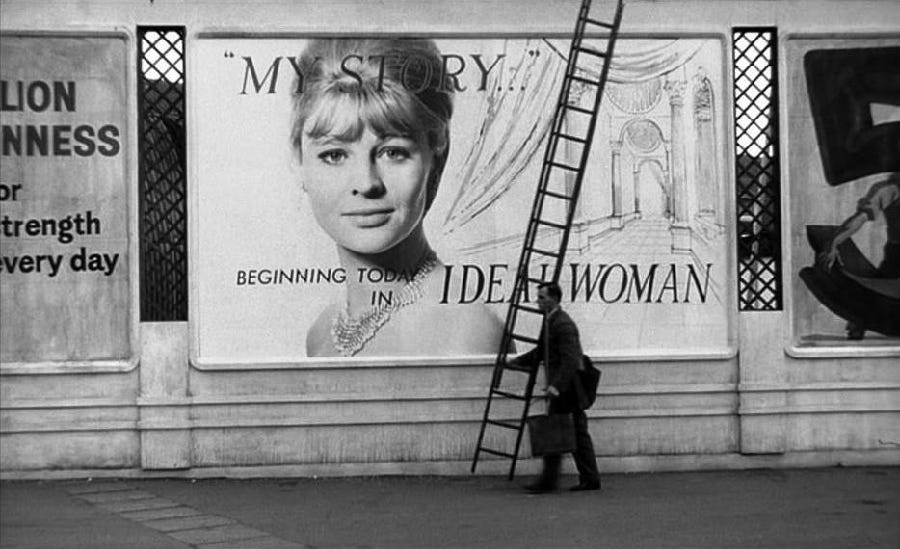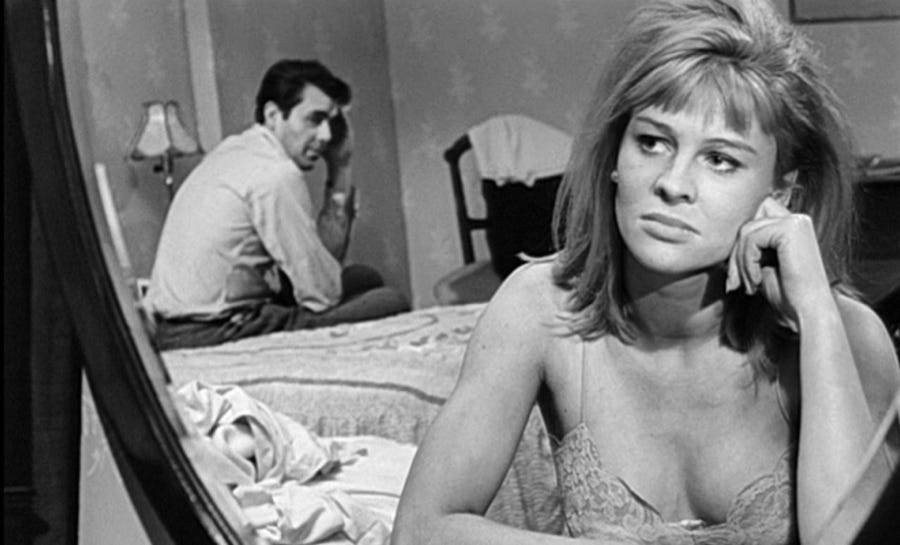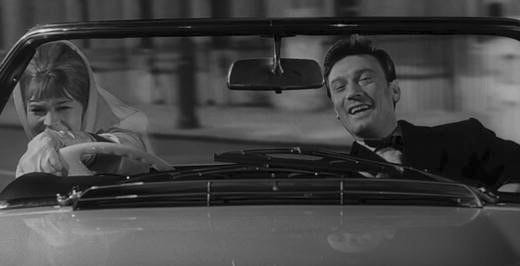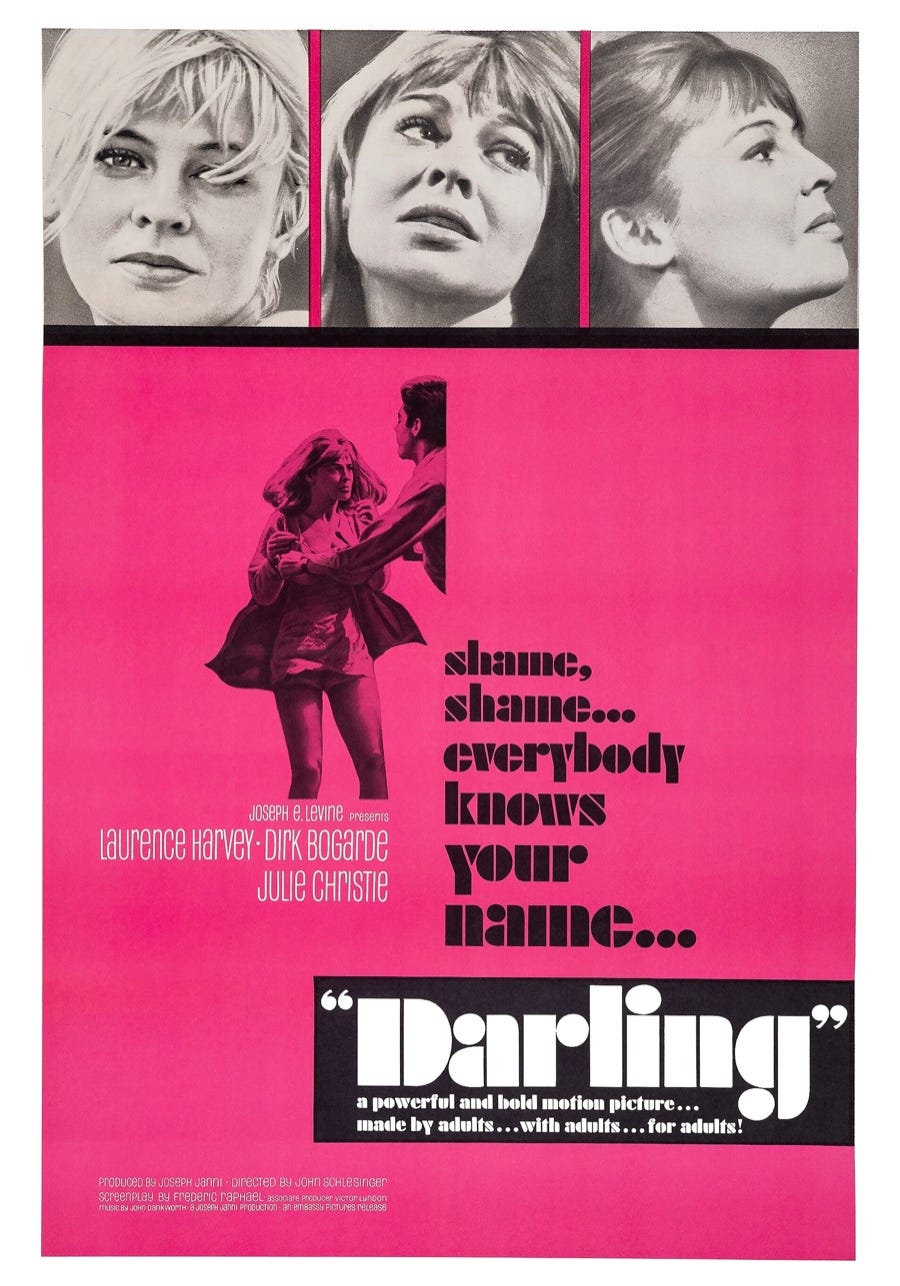As it’s Good Friday, this one’s complimentary; for everybody— both ‘paid for’ and ‘free’ subscribers:
I first came to Darling (1965) in the late Eighties. Supposedly studying for a barristers’ conversion course in law (student gowns and bad Inner Temple port), I spent my time instead watching old films— obsessively— from the 1960s. The Servant (1963), Darling (1965), Interlude (1968), Blow-Up (1968)- and Roger Ebert’s amusing flick Beyond the Valley of the Dolls (1970) were particular favourites, films watched many times over repeated viewings. Except, thinking about it, were they really that ‘old’? Twenty years or so, actually— the same distance, today, say, as American Psycho (2000) or Lost in Translation (2003).
Curiously, during the Eighties, the Sixties seemed further away than the 2000s today— at least in terms of fashion and interior decoration. Apart, perhaps, from the beneficial curse of iPhone and net. But during the late Eighties and the early Nineties, twenty-something creative types began to reinvent the Sixties— with edgy Channel 4 showing an entire run of The Avengers and indie bands Swing Out Sister, Mono and Saint Etienne rediscovering the music of Michel Legrand, Ennio Morricone and Burt Bacharach— a trend ultimately degenerating into the Austin Powers phenomenon and the High Street retro revival.
Anyway. Back to Darling. Julie Christie stars as Diana Scott, a vacuous but damningly attractive Sixties It Girl, who dumps her boring husband to claw her way up Society’s greasy pole, using her feminine charms to work through a succession of influential older men: Robert Gold (Dirk Bogarde), a distinguished BBC television presenter; Miles Brand (Laurence Harvey), an odious advertising executive, as smooth as an oil slick; Malcolm (Roland Curram), a gay fashion photographer and, finally, when she meets her match, Prince Cesare della Romita (José Luis de Vilallonga), scion of the Italian aristocracy.
Now Julie Christie, Dirk Bogarde and Laurence Harvey happen to be three of my all-time favourite actors; John Schlesinger, a favourite director (Sunday Bloody Sunday (1971)) and Cold Comfort Farm [1995]), and Frederic Raphael one of my all-time favourite writers (Two for the Road [1967] and Eyes Wide Shut [1999]). To watch Darling is a masterclass in British talent: it explains why Swinging London— in a relatively short time— became the centre of all that was hip, fashionable, creative and interesting. And all of ‘em are bloody marvellous. Dirk, especially. Robert Gold’s an urbane, Hampstead-dwelling television titan— based, I gather, on Robert Kee, the distinguished correspondent and presenter of Panorama. Taking Diana’s stultifying English upper-middle-middle-class background into account (‘pass the mustard dear’— mahogany dining room tables, minor public school ties and National Service commissions), it’s easy to see why Mr Gold’s intellect (despite the cardigan, knitted tie and Austin Morris 1100) appeals.
Miles Brand, on the other hand, is all style over substance, a ruthless executive with Modernist office, oiled quiff, and a Mercedes-Benz Pagoda Top. We’re in international man of mystery territory— and who better than Laurence Harvey (later Columbo villain) to play it? Julie Christie, in the same way, just has it— whatever ‘it’ is. She’s marvellously subtle (Fahrenheit 451 (1966), The Go-Between (1971), Don’t Look Now (1973) and Donald Cammell’s Demon Seed [1977]); her considerable looks, too, very much of the time— not ‘beautiful’ in the sense of the 40s or 50s femme fatale (Viv, Hedy and Gene) but something more modern, as New York magazine put it, writing on Mod fashion: ‘This new, déclassé English girl was epitomized by Julie Christie in Darling— amoral, rootless, emotionally immature, and apparently irresistible...’
Darling was a critical and financial success, winning three Oscars for Best Actress, Best Screenplay and Best Costume. Its adultery, kinky existentialist sex party (tut-tut), homosexual characters, and Fortnum’s shoplifting scene must have seemed shocking at the time— at least to the good burghers of Tunbridge Wells and Gerrard’s Cross. These days, it’s more of a delicious— and highly amusing— Sixties period piece, whimsical— in that Sixties way— perhaps even ‘dated’ (whatever that means), certainly when compared to Schlesinger’s new wavy Sunday Bloody Sunday (1971). It’s all a bit knowing, with obvious irony- like a Sunday colour supplement cognac ad juxtaposed with an earnest photojournalistic piece: the Vietnam War or a cannibalistic ‘plane crash in the Andes.
Still, despite the period charm, or because of the period charm, Darling shines— also helped along by Johnny Dankworth’s smooth jazz score. Diana’s chocolate commercial- filmed in an Italian palazzo and set to a nifty little Bach number à la Swingle Singers is priceless. As, too, is Frederic Raphael’s brilliant, witty and pithy script:
Robert: Your idea of fidelity is not having more than one man in bed at the same time. You're a whore, baby, that's all. Just a whore. And I don't take whores in taxis.
Diana (cockney accent): A pound’s not enough!
Robert: You’re not worth more than a bloody quid anyway!
Diana: I’m an honest working girl.
Robert: A fiver in the Walworth Road, that's about your bloody mark!
So there you are. John Schlesinger’s Darling (1965). Two hours, eight minutes of amoral, urbane entertainment. A worthy addition to the Luke Honey’s WEEKEND FLICKS. film archive. I watched it on a digitally-restored DVD, and it’s also available on Blu-ray and digital download for Amazon Prime Video members.
You’ve just been reading a complimentary newsletter for free and 'paid-for' subscribers. I hope you enjoyed it. Thank you to all those of you who have signed up so far. Really appreciated.
There are two options on Luke Honey’s WEEKEND FLICKS. Cinema for Grown Ups: ‘Paid-for’ subscribers get an extra exclusive film recommendation every Friday morning, plus full access to the complete archive— which should list over a hundred films by the end of the year. It costs £5 a month (or £50 a year)— a bargain, frankly, when you compare it to a few cups of coffee or a pint of beer in the pub. ‘Free’ subscribers get access to the Sunday newsletter, plus the ‘free subscriber’ films in the archive. Either option is a good bet.
In the meantime, have a relaxing and cinematic Good Friday...












You’re absolutely right, Luke, about Julie Christie having ‘it’, whatever ’it’ is, for she could do no wrong, and never looked less than incandescent on the screen while, erm, doing ‘it’!
Also a big fan of Laurence Harvey (perhaps the best possible candidate for Bond to never get it, though I know Connery was absolutely right for the first outings) and Bogarde, who always carried a look of hidden pain in his face and demeanour, even while looking his most very handsome best.
Again, not seen for yonks, but I’ll have to go back now and revisit, which absolutely won’t be a chore, thanks to you, Luke!
Is Shampoo on your to-do list?
Superb performances and direction and a real slice of the sixties just when it's beginning to swing.
But does anyone understand why that woman sings Santa Lucia at the end? I've come to conclusion it's just one of those nouvelle-voguey things that links back to the earlier scene in the film and holds no specific meaning, but..??